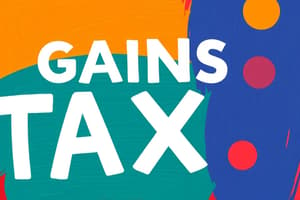Podcast
Questions and Answers
Which of the following are considered chargeable persons for capital gains tax (CGT) purposes in the UK?
Which of the following are considered chargeable persons for capital gains tax (CGT) purposes in the UK?
- Individuals resident in the UK (correct)
- Charities
- Companies paying corporation tax
- Non-resident individuals
Which of the following are considered chargeable disposals for CGT purposes?
Which of the following are considered chargeable disposals for CGT purposes?
- Sale of an asset
- Gift of an asset
- Loss or destruction of an asset
- All of the above (correct)
Transfers of assets on death are exempt from CGT.
Transfers of assets on death are exempt from CGT.
True (A)
Gifts to charities are subject to CGT.
Gifts to charities are subject to CGT.
Personal use currency is exempt from CGT.
Personal use currency is exempt from CGT.
National Savings Certificates and premium bonds are subject to CGT.
National Savings Certificates and premium bonds are subject to CGT.
Which of the following is NOT an allowable deduction for CGT purposes?
Which of the following is NOT an allowable deduction for CGT purposes?
What is the annual exempt amount (AEA) for CGT in 2023/24?
What is the annual exempt amount (AEA) for CGT in 2023/24?
Unused AEA can be carried forward to future tax years.
Unused AEA can be carried forward to future tax years.
What is the CGT rate for gains on residential property that is NOT your main residence?
What is the CGT rate for gains on residential property that is NOT your main residence?
What are the main steps to compute CGT payable by an individual?
What are the main steps to compute CGT payable by an individual?
When is the date of disposal usually determined for CGT purposes?
When is the date of disposal usually determined for CGT purposes?
Flashcards
Capital gains tax
Capital gains tax
Tax on chargeable gains from asset disposals by chargeable persons.
Chargeable persons
Chargeable persons
Individuals in the UK, excluding companies that incur corporation tax instead of CGT.
Chargeable disposal
Chargeable disposal
Selling, gifting, or losing an asset can lead to chargeable gains.
Exempt from CGT
Exempt from CGT
Signup and view all the flashcards
Exempt assets a-d
Exempt assets a-d
Signup and view all the flashcards
Exempt assets e-k
Exempt assets e-k
Signup and view all the flashcards
Calculation of capital gains
Calculation of capital gains
Signup and view all the flashcards
Steps to compute CGT
Steps to compute CGT
Signup and view all the flashcards
Disposal proceeds
Disposal proceeds
Signup and view all the flashcards
Market value in disposals
Market value in disposals
Signup and view all the flashcards
Connected person
Connected person
Signup and view all the flashcards
Allowable deductions
Allowable deductions
Signup and view all the flashcards
Basis of CGT
Basis of CGT
Signup and view all the flashcards
Annual Exempt Amount (AEA)
Annual Exempt Amount (AEA)
Signup and view all the flashcards
AEA unutilized
AEA unutilized
Signup and view all the flashcards
Rates of CGT
Rates of CGT
Signup and view all the flashcards
Rate of CGT (1)
Rate of CGT (1)
Signup and view all the flashcards
Rate of CGT (2)
Rate of CGT (2)
Signup and view all the flashcards
Steps to CGT computation
Steps to CGT computation
Signup and view all the flashcards
Date of disposal
Date of disposal
Signup and view all the flashcards
Study Notes
Capital Gains Tax (CGT)
- Capital gains tax (CGT) is levied on chargeable gains arising from the chargeable disposal of chargeable assets by a chargeable person.
- Chargeable persons include UK residents. Companies pay corporation tax on gains, so they are not subject to CGT.
- Chargeable disposals include sales, gifts, and losses/destruction of assets.
- Some assets are exempt from CGT; these include transfers on death, and gifts to charities.
- Certain assets are also specifically exempt, for example: cars, main residences, wasting chattels (like greyhounds or racehorses), currency, medals (inherited, not purchased), national savings certificates, lottery winnings, stock, ISAs, damages, and life insurance policies.
Calculating CGT for Individuals
- Individuals are taxed on taxable gains from all assets disposed of in a tax year.
- CGT liability only arises when an asset is disposed of; appreciation does not trigger it.
- The steps to compute CGT payable are:
- Calculate gain/loss for each asset separately.
- Calculate net chargeable gains (gains minus allowable losses).
- Deduct the annual exempt amount.
- Deduct capital losses carried forward.
- Calculate CGT payable.
Key Terms and Concepts
- Disposal proceeds: Normally the sale price, minus incidental costs (e.g., agent fees).
- Market value substitution: Used when the disposal wasn't at arm's length (e.g., gifts, transfers between connected people).
- Connected person: Spouse, relatives, business partners, and their spouses, for CGT purposes.
- Allowable deductions: Acquisition cost, enhancement expenditure (improvements), and incidental costs of acquisition.
- Basis: Tax on gains from current-year disposals.
- Annual Exempt Amount (AEA): £6,000 in 2023/24. Unused AEA is lost, not carried forward.
- CGT Rates: Normal rates (10%, 20%) apply, with specific rates for residential properties (18%, 28%). Main residences are exempt.
- Date of disposal: Usually the date of the contract, or when conditions are met for a conditional contract.
Studying That Suits You
Use AI to generate personalized quizzes and flashcards to suit your learning preferences.



